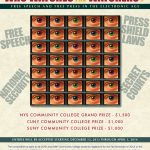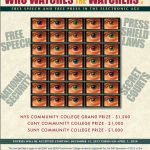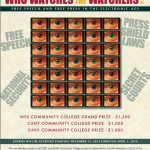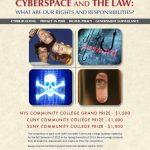From the Historical Society of the New York Courts: Garfinkel Essay Contest Poll
From the Historical Society of the New York Courts: Garfinkel Essay Contest Poll
What should the topic be for our 2014 contest?
With the generous support of Gloria and Barry Garfinkel, the Society has offered annually since 2008 The David A. Garfinkel Essay Contest established in memory of the Garfinkel’s son David. This contest targets students from community colleges across New York State, offering them the opportunity to submit essays on topics of New York legal history. The competition seeks to draw students with a wide range of interests in law, history, social science and general research writing. The grand prize is $1,500, and the CUNY & SUNY Community College Prizes are $1,000 each. The winners of the competition are honored on Law Day each year held in the magnificent courtroom of the New York Court of Appeals. Their families and professors are invited for a memorable day at the courthouse for the awards ceremony followed by a luncheon where they are graciously and warmly greeted by the Court of Appeals Judges.
2013 Michael Oshima Diversity Essay Competition
The following opportunity may be of interest to Law Students
The City Bar Committee on Minorities in the Profession is now accepting applications for the 2013 Michael Oshima Diversity Essay Competition. Monetary awards will be made to 3 candidates on the basis of their essay and their having demonstrated significant personal achievements and strong community involvement. The first place winner will receive an award in the amount of $1,500, second place will be $1,000, and the third place winner will receive $500.
The deadline for the submission/receipt of all materials is
May 31, 2013. Prize winners will be notified in July 2013.
The Michael Oshima Diversity Essay Competition was established in honor of Michael Oshima, an individual who dedicated much of his legal career to ensuring that our profession remains diverse and open to all people no matter their race, ethnic or national origin, sex or sexual orientation. Michael contributed countless hours to the betterment of the legal profession and he served on a number of bar committees, including as Chair of the Committee on Minorities in the Profession of the New York City Bar Association. The Committee on Minorities in the Profession is sponsoring this scholarship to honor the life and memory of such a worthy man.
Before his untimely passing, Michael was Deputy General Counsel at Safe Horizon Inc., an organization that provides support, prevents violence, and promotes justice for victims of crime and abuse, their families and communities. Prior to joining Safe Horizons, he served for six years as the Administrative Partner for the New York office of Arnold & Porter LLP. At Arnold & Porter, Michael counseled corporate officers and foreign governments in Latin America and around the world in securities offerings, lending transactions, loan restructurings and corporate governance matters. Michael was also very active in pro bono work and, for example, helped a battered woman who was not a citizen of the U.S. obtain a self-petition to remain in this country under the Violence Against Women Act. In addition, Michael championed initiatives to increase diversity at Arnold & Porter. During his tenure as Administrative Partner, the New York office twice received (in 2003 and 2005) the Minority Corporate Counsel Association’s Thomas L. Sager Award, which recognizes law firms’ efforts to improve diversity.
Born on April 4, 1957, Michael was raised in Kona, Hawaii and was a graduate of Brown and Harvard universities. Michael received his J.D. in 1987 from New York University School of Law, where he was Editor-in-Chief of the Annual Survey of American Law. Michael was also active as a Board member of the Asian American Arts Alliance, Inc. and the Japanese American National Museum. In his biography, Michael described himself as an experienced leader and attorney with strong interpersonal skills, a sense of humor and a grace under fire. He could not have said it any better. The legal community suffered a great loss when Michael passed away suddenly on July 11, 2008.
National Bar Association Accepting Applications for 2013 Advocacy Competition-Deadline February 28!
The National Bar Association (NBA) is accepting applications for its 2013 Dr. Martin Luther King, Jr. Drum Major for Justice Advocacy Competition. More than $25,000 in scholarships will be awarded to high school juniors and seniors who place in the regional and national competitions. To compete, eligible students must submit an essay by February 28, 2013. For the fourth consecutive year, MetLife is proud to be the Platinum sponsor of the program.
High school juniors and seniors from across the country are invited to submit an essay for the 2013 competition. In no more than 1,000 words, students should address the following issue: Consider how Trayvon Martin was killed walking to his home on February 26, 2012 by George Zimmerman, a Florida neighborhood watchman in a gated community. Some have justified Zimmerman’s actions based on Florida’s “Stand Your Ground” law. If Martin Luther King, Jr. were alive, would he advocate repealing this law and other similar laws? Please discuss why or why not.
For more information, please visit www.nationalbar.org/mlkcompetition.
Deadline to Apply – David A. Garfinkel Essay Contest

CUNY and SUNY winners will be awarded $1000 each with one winner awarded the New York State (NYS) Community College Grand Prize of $1,500. The winners will also be honored at the Law Day ceremony at the Court of Appeals Hall an event at which the Chief Judge of the State of New York presides and the Governor, the Attorney General, and the Bench and Bar of New York attend.
DEADLINE: April 5, 2013.
ESSAY TOPIC: ‘Cyberspace and the Law: What are Our Rights and Responsibilities?’
Students can choose one of the following questions to develop their essays:
Essay Question 1 – Cyberbullying: Examine the newly-enacted New York law governing cyberbullying and analyze current research on cyberbullying prevention. How do we balance the First Amendment free speech rights of students with the need to prevent the harm (including death) to students who are the targets of cyberbullies?
Essay Question 2 – Digital Piracy: One of the benefits of cyberspace is the ease with which we can maintain contact with our friends and share important aspects of our lives. However, sometimes the things we would like to share are copyrighted artistic works and file-sharing would run afoul of copyright laws. How can we ensure that the rights of both the copyright owners and those of lawful download owners are fair and balanced?
Essay Question 3 – Privacy in Peril: Privacy is the power to control how much other people know about us. Few of us realize the extent to which our Internet activities are tracked or know that our digital footprints remain traceable, often for long periods of time. How can we balance our digital lives and our personal privacy?
Essay Question 4 – Government Surveillance: The right to be free of unwarranted search and seizure is enshrined in the Fourth Amendment of the U.S. Constitution. But new technologies such as manufacturer installed GPS systems in cars, cell phone tracking and the introduction of surveillance drones in the United States have made widespread law enforcement and governmental surveillance of the American population possible. Is this technology eroding our Fourth Amendment rights and forcing us to change our expectations about privacy in public spaces?
RULES AND RESOURCES:
– Visit www.nycourts.gov/history
– “Like” us on Facebook at The Historical Society of the New York Courts
– Follow us on twitter: @NYLegal_History






